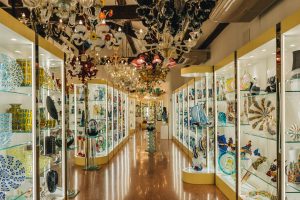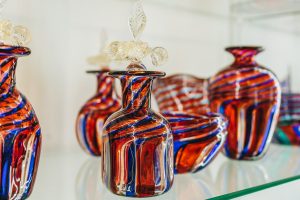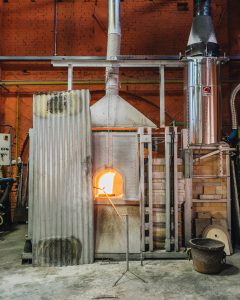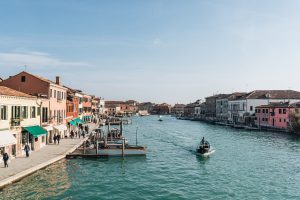Murano glass: craftsmanship and tradition
The island of Murano offers you the unique experience of taking a close look at the art of glassmaking. A tradition that goes back to the 8th century and that has been handed down from generation to generation. Today, it is thanks to expert glassmakers and their unique creations that this art is not only still alive, but also became well-known all over the world.
Nowadays the Murano glassmaking, a magic-like process that turns sand, fire and air into the finest glass, is still handmade. Even big factories always have a master glassmaker in charge of supervising the production. Despite the influence of technology, which – as for any business – played its role, on Murano it will still feel like taking a step back in time: manufacture processes are, indeed, still the traditional ones.

The origins of the art of glassmaking
The origins of this art in the Venetian area are for sure very ancient. Yet there is a particular event which made Murano the true homeland of glass, making it possible to hand down this tradition to the present day. It is told that in 1291 the Doge of Venice ordered all Venetian glassmakers to move their furnaces (fornaci) to Murano in order to prevent fires, since most of the buildings in Venice were made of wood. From that moment on, Murano became a true “floating factory”.
Did you know that…? For glassmaking is very difficult and expensive, at that time glassmakers were entitled some privileges and immunities. On the other hand, they were never allowed to leave Venice. The Venetian government wanted to exclusively preserve the secret of Murano glass art and prevent it from spreading beyond Venice’s geographical boundaries. Hence the unrivaled excellence that Murano still holds after centuries.
Many of the historical glassmakers such as FerroMurano, Salviati, Barovier & Toso became international brands. Nevertheless, their artisans still use the traditional techniques. Among the most appreciated creations there are chandeliers and murrine, a symbol of the Made in Italy, protected by a trademark that guarantees their origin and quality.

The Murano glassmaking
Glass is mainly composed of silica, a compound that melts at high temperatures. The time between the two statuses, when the glass becomes soft and malleable, allows the artisan to shape glass. There are other raw materials, called flux or fluxes, which soften at lower temperatures, thus letting the glassmaker more time to shape the material. An example? Sodium oxide.
Murano glassmaking can be divided into two steps. The first step includes all processes that use raw materials (sand, soda and other compounds) or raw glass. These elements are melted in specific ovens to obtain the mixture that will be then processed in the second phase.
To the second step belong all the processes that give glass its final shape, such as the lampworking with the use of glass rods, the glass fusing and other “cold” processes, such as decoration, grinding and engraving.

The Glass Museum
If you’re interested in the art of glassmaking, check out the Museo del Vetro (Murano Glass Museum), located in the Palazzo Giustinian. The Museum was founded in 1861 by Antonio Colleoni, mayor of Murano, and by the abbot Vincenzo Zanetti, a glass art enthusiast. Their aim was to create an archive on the history and life on the island of Murano, which at that time was recovering from the deep crisis following the fall of the Republic of Venice, in 1797.
The archive soon turned into a proper museum, thanks to the donations of the Murano furnaces, which provided it with many ancient and contemporary glass samples and, in the second half of the 19th century, restored their intense production. Today, thanks to further acquisitions received over the last century, you can also admire Renaissance glass samples and an important collection of ancient glassware coming from archaeological excavations.
A yummy break in Murano
If you are in Murano we suggest you to walk through Calle Angelo dal Mistro and taste one of the delicacies of the Murano Gelateria Artigianale. This is a small ice cream shop where the ice cream is made in a completely artisan way. Here you can find the most traditional ice cream tastes, but also some unusual variants. If you can’t decide, salted pistachio is a guarantee!



